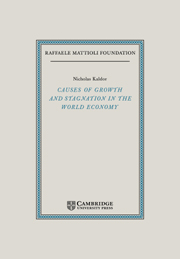Book contents
- Frontmatter
- Contents
- Preface
- Acknowledgements
- CAUSES OF GROWTH AND STAGNATION IN THE WORLD ECONOMY
- FIRST LECTURE Equilibrium Theory and Growth Theory
- SECOND LECTURE Alternative Approaches to Growth Theory
- THIRD LECTURE The Problem of Intersectoral Balance
- FOURTH LECTURE The Effects of Interregional and International Competition
- FIFTH LECTURE Policy Implications of the Current World Situation
- DISCUSSION
- NICHOLAS KALDOR, A BIOGRAPHY, by A. P. Thirlwall
- BIBLIOGRAPHY OF THE WORKS OF NICHOLAS KALDOR, compiled by Ferdinando Targetti
- BIBLIOGRAPHY OF WORKS CITED
- LIST OF ABBREVIATIONS
- INDEX
- Cambridge Cultural Social Studies
DISCUSSION
Published online by Cambridge University Press: 23 December 2009
- Frontmatter
- Contents
- Preface
- Acknowledgements
- CAUSES OF GROWTH AND STAGNATION IN THE WORLD ECONOMY
- FIRST LECTURE Equilibrium Theory and Growth Theory
- SECOND LECTURE Alternative Approaches to Growth Theory
- THIRD LECTURE The Problem of Intersectoral Balance
- FOURTH LECTURE The Effects of Interregional and International Competition
- FIFTH LECTURE Policy Implications of the Current World Situation
- DISCUSSION
- NICHOLAS KALDOR, A BIOGRAPHY, by A. P. Thirlwall
- BIBLIOGRAPHY OF THE WORKS OF NICHOLAS KALDOR, compiled by Ferdinando Targetti
- BIBLIOGRAPHY OF WORKS CITED
- LIST OF ABBREVIATIONS
- INDEX
- Cambridge Cultural Social Studies
Summary
Professor Amedeo Amato: I would like to thank Lord Kaldor for his fascinating lectures, and also to take this opportunity to thank him for his equally fascinating lectures that I was able to attend at the University of Cambridge many years ago.
In these Mattioli lectures Lord Kaldor has gone to the heart of many of the basic problems facing the world economy. However, I would like to put forward a question on which he only touched upon here, although he has made fundamental contributions in the past. This question also involves some important aspects of his critique of the economic policy of Mrs. Thatcher (see The Scourge of Monetarism). It concerns the effects of fiscal actions; that is, the impact of an increase in the budget deficit when it is financed not by increasing the money supply but by the issue of bonds.
Professor Kaldor has developed an analysis of this problem which is partly different even from the view shared by most Keynesian economists. Indeed, a bitter debate between Keynesians and monetarists – a continuation of the debate between Keynes and the Treasury – has gone on for many years on this question.
- Type
- Chapter
- Information
- Causes of Growth and Stagnation in the World Economy , pp. 93 - 142Publisher: Cambridge University PressPrint publication year: 1996



